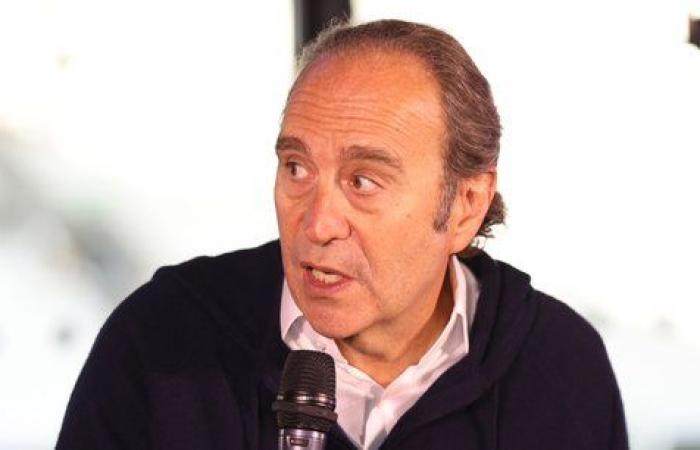THE TRIBUNE. At the start of the school year, you published a book with a provocative name “ A real desire to make a mess “. Is AI “ make a mess », to reshuffle the cards?
XAVIER NIEL. The rise of AI is, ultimately, something relatively simple. There is a product coming out, ChatGPT, which is becoming a mainstream product, and which is revealing generative AI technology to the whole world. Things happened, it is true, very quickly. However, I do not believe that AI will replace humans, I do not believe in this magical vision. AI will, on the other hand, make human beings more powerful, and that is why it is a revolution. This technology will change our lives. Ct is an upheaval at least as important as the existence of the Internet, because we will find AI everywhere, at every moment.
Is there not a financial madness of AI, with excesses to boot?
Some believe that investments and valuations in AI are crazy. But it’s the AI market that is crazy, its potential that is incredible. At the end of the 2000s, there were excesses on the Internet, because there was no market in front of it, and therefore financing without revenue. With AI, we are not at all in the same logic.
OpenAI unveils its search engine, a tool to compete with Google
There is a market, products, models, and recipes. We see it with an actor like OpenAI. She valuation of 150 billion in the last round may seem crazy. But in the other direction, OpenAI has created a model, a global brand. 7 or 8 out of 10 humans on Earth know the brand. OpenAI has had the strongest growth in the history of start-ups. It's totally deserved. The market is huge in terms of size: we are talking about the fact that 7 billion human beings are going to be improved.
You invest in a lot of start-ups. How much exactly? In what ways?
Today we have three types of investments. First of all, we try to discover the talents of tomorrow, a field in which we carry out more than a hundred operations per year. Afterwards we are moving towards higher investments, with a logic of support. And finally, operations on much more mature companies. We dig everywhere, we receive around fifty files per day. The challenge for us is to detect in this mass the project of tomorrow. We therefore found ourselves associated very early on in gems, like with Square. And we can open doors for them.
The word entrepreneur is a French word used around the world
Last year you invested in Kyutai, a sort of AI laboratory, with Eric Schmidt, the former boss of Google, and Rodolphe Saadé, the CEO of CMA CGM (owner of La Tribune, editor’s note). What is the vision of this investment?
The vision is quite simple. We have incredible talents in France, particularly at the CNRS, but with low salaries. How can we ensure that these talents stay in France? Because we need them, in particular to build European models in the field of AI. If we try to retain these researchers only with commercial projects, it doesn't work.
Is Moshi, Kyutai's voice AI, pulling the rug out from under OpenAI?
This is the whole spirit of Kyutai: offering experts a laboratory, a research space. I am delighted that we have succeeded in doing so, in taking this vision with Eric Schmidt and Rodolphe Saadé beyond our own issues. JI was used to having American friends who came to help us. But finding entrepreneurs in France who have a vision beyond their own interests is something completely new.
With Kyutai, nWe went looking for talent, and today it is an incredible product. I'm happy that in the United States they talk to me about Kyutai or even Mistral. And yet, the funds that have been put into these projects are low compared to the investments that are made in the United States.
Kyutai gave birth to Moshi, a conversational AI. When it was launched last summer, you were questioned about your English accent…
My level of English is, as you can guess, perfectible. But this interaction demonstrates the full power of Moshi. With a voice assistant like Siri, you are in a system that takes your voice, analyzes it, transcribes it and provides you with a response. With Moshi, you are in a 100% voice AI model, which can interrupt you and interact.
It’s a revolution, which will make it possible to interact with AI in an intelligent way. The eight Kyutai researchers who worked on Moshi managed to do better than the hundreds of people working on ongoing projects in the United States. A beautiful demonstration of “small is beautiful”.
You believe that there are too few private entrepreneurs in France who invest in innovation. What is this due to? Is there a French misfortune? We have already lost the battle of the Internet and the battle of the cloud…
I feel like we're going to win them all! We have two great advantages. There is a visible benefit and a real benefit. The visible advantage is that the word entrepreneur is a French word used all over the world. So we must have something in our body, another DNA that makes us entrepreneurial. The second thing is we have incredible schools. They produce the world's best researchers in artificial intelligence.
These talents sometimes leave France, sometimes return, sometimes stay. We lack new businesses, new entrepreneurs. We lack role models. For this reason, what the three co-founders of Mistral are doing is incredible. They create an image of new entrepreneurs which can make others want to go there. Because it's a statistical law: the more talents we have who try, the more success we will have.
When I meet ministers, they often tell me what can we do to help you?
Mistral is established as a symbol of the French AI ecosystem. But, globally, other start-ups are much more funded. In this context, Mistral could logically be an acquisition target. How can I give him more money?
Who controls Mistral? Its three founders. And I don't care about his investors. If you take the CAC 40 companies, there are many players whose shareholding is purely and predominantly foreign. So that's not the point. The topic is where is the control? Where are jobs created? Where is the growth? Where is the invention? Where is the genius? This is what we need.
Funding has become globalized. I invest in start-ups in the United States, and American investors invest in start-ups in France. We have a market that has become globalized. Due to the size of the country, its wealth, its structures, particularly with a private pension system, the United States has a lot of funds to invest. They logically come to invest in France. And so much the better if they come and invest in Mistral! What interests me is that Mistral continues to have its French roots.
Donald Trump promises massive deregulation in technologies, particularly in AI. Europe has the opposite path. Is this the right choice?
First of all, I believe in entrepreneurs. We must stop systematically relying on the State. The state sets rules, creates a structure, creates an environment, can help, but in the end we need entrepreneurs and people who do things. When I meet ministers, they often tell me what can we do to help you? To support the economy, we above all need stability on the part of public authorities. Don't move my structure too much. That's my real subject. Every time we try to modify the structure, I fear getting lost, of no longer understanding how it works.
Donald Trump's plan to twist the arm of Europe
We have had seven years of stability in France. On a certain number of subjects, this period helped France, in particular by bringing investors from all over the world. We must continue in this logic for as long as possible. Because it is the people who invest in this country, because it is the entrepreneurs who create wealth, who generate taxes and revenue, who allow France to be a privileged country on a certain number of subjects .
Aren't the large CAC 40 companies a little conservative in the face of the excitement of start-ups?
Aren't we happy to have these big companies? Doesn’t having them allow the emergence of start-ups? These companies are evolving and learning. A company is made to be born, to live and to disappear, that’s how it is. The subject is above all the number of companies of a significant size in a country, to be able to exist beyond borders. France is the country in the world in which the most telecommunications operators located outside its borders are controlled.
Is the fact that Europe remains a fragmented market another problem?
Certainly, there is fragmentation in Europe. But this fragmentation has taught us competition. When we launch into other markets, having four or five players from the same country is a truly exceptional opportunity. This is the case in telecoms, where French players have formidable international positions. Let's stop torturing ourselves. It's in our nature to say that everything is bad, that things are better elsewhere. While it’s still great here, in France.
What seems most important to me is to learn how to learn, and no longer to learn by heart.
The interministerial committee on AI issued a report last March in which it estimated that 5 billion more investments per year were needed in France or risk a historic decline. Are the public authorities playing the game?
In France, we have incredible luck with BpiFrance. When BpiFrance was created, I told myself that putting public money into financing start-ups was nonsense. Well, I was wrong. BpiFrance is incredible. They finance a significant part of the ecosystem at all levels, at all stages. It doesn't exist anywhere in the world. Being an entrepreneur in France is much simpler than being an entrepreneur in the United States, believe me.
However, French start-ups still have difficulty reaching the large company market…
Why will companies or public services buy cloud from Microsoft? Maybe because we don't have a good enough equivalent here. It is up to us, collectively, to work to succeed with products and services that work, and which are capable of convincing large companies to buy French or European.
You are an entrepreneur who has invested in education. What are the consequences of AI for our children?
I think it was already underway. Knowing it by heart is good, but we now have access to knowledge permanently, at our fingertips. The important thing is to teach our children how to learn, that is, how they are capable of doing the necessary research.
They must be able to objectively judge the answer given, to have a critical mind to judge this answer. But that's what seems most important to me, is to learn how to learn, and no longer to learn by heart something that will be out of fashion and obsolete very quickly.
Do you see yourself as a French Elon Musk?
Listen, I think that in life, we are neither black nor white. We are all gray. We all have a mix of shiny things and not so shiny things. I was lucky enough to not do too badly in the entrepreneurship profession. But I'm a dwarf compared to Elon Musk who is an incredible entrepreneur, a genius. And I just think that he's so white, totally pure white, in terms of entrepreneurship, that there must be a black side.






